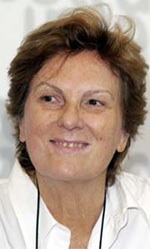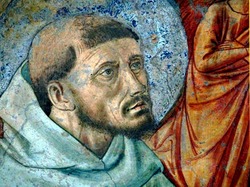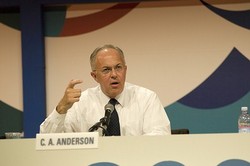On the Thirtieth Anniversary of the Founding of Communion and Liberation
Rome, September 29, 1984
Dearest Brothers and Sisters! I wish first of all to thank Msgr Giussani for his introductory remarks, as well as all the others who took part in this introduction.
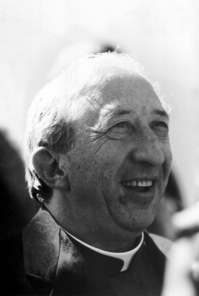
1. I express my great joy for this meeting with you, who have come here to Rome to celebrate thirty years of your movement and to reflect together with the Pope on your history as persons who live in the Church and are called to cooperate in intense communion, to bring it to mankind, and to spread it in the world.
Looking at your faces, so open, so happy on this festive occasion, I experience a deep feeling of joy and the desire to show you my affection for your decision of faith and to help you to be ever more mature in Christ, sharing His redemptive love for man. The photographic exhibition which I was able to admire as I entered the room, words (testimonies, accounts, and songs) that I have just heard have allowed me to retrace, as from within, this period of your life, which is part of the life of the Italian Church (and not only Italian any longer) of our time. These words have given me the possibility of seeing clearly the educational criteria of your way of living in the Church, which imply a vivacious and intense work in the most varied social contexts.
I am grateful to the Lord for all this, who once again has made me admire His mystery in you, which you bear and must always be ready to bear, with humble awareness of being pliable clay in His creative hands.
Continue with commitment on this road so that also through you the Church may still more be the environment of the redemptive existence of man, a fascinating environment where every man finds the answer to the question of the meaning of his life: Christ, center of the cosmos and of history.
2. Jesus, the Christ, He in whom everything is made and subsists, is therefore the interpretative principle of man and his history. To affirm humbly but equally tenaciously that Christ is the beginning and inspirational motive for living and working of consciousness and of action, means to adhere to Him, to make present adequately His victory over the world.
To work so that the content of the faith becomes understanding and pedagogy of life is the daily task of the believer, which must be carried out in every situation and environment in which they are called to live. And the richness of your participation in ecclesial life lies in this: a method of education in the faith so that it may influence the life of man and history; in the sacraments, so that they bring about an encounter with the Lord, and in Him with the brethren; in prayer, so that it be an invocation and praise of God in authority, so that it be a guard and guarantor of the authenticity of the ecclesial path.
The Christian experience so understood and lived generates a presence which places the Church in every human situation as the place where the event of Christ, "a stumbling-block to the Jews... foolishness for the pagans" (1 Cor l; 23-24), lives as a horizon full of truth for man.
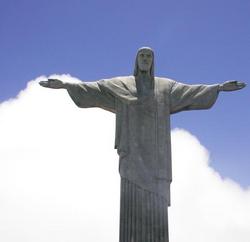
3. We believe in Christ, dead and risen, in Christ present here and now, who alone can change and changes man and the world, by transfiguring them.
Your presence, ever more numerous and significant in the life of the Church in Italy and in various nations in which your experience is beginning to spread, is due to this certainty which you must deepen and communicate, because it is this certainty that moves mankind. It is significant in this regard, and it should be noted, how the Spirit, in order to continue with the man of today that dialogue begun by God in Christ and continued in the course of all Christian history, has raised up many ecclesial movements in the contemporary Church. They are a sign of the freedom of forrns in which the one Church is expressed, and they represent a secure newness, which still awaits being adequately understood in all its positive efficacy for the Kingdom of God at work in the present moment of history.
My venerated predecessor, Pope Paul VI, addressing the members of the Florentine community of Communion and Liberation on December 28, 1977, stated: "We thank you also for the courageous, faithful, and firm witness that you have given in this somewhat disturbed period because of certain misunderstandings you have had to face. Be happy, be faithful, be strong and joyful and carry with you the witness that the Christian life is beautiful, strong, serene, and really capable of transforming the society in which it is lived."
4. Christ is the presence of God with man, Christ is the mercy of God towards sinners. The Church, the Mystical Body of Christ, and the new People of God, brings to the world this tender benevolence of the Lord, encountering and supporting man in every situation, in every environment, on every occasion.
In so doing, the Church contributes to generating that culture of truth and love which is able to reconcile the person with himself and with his own destiny. In such a way the Church becomes the sign of salvation for man, whose every desire for freedom she welcomes and values. The experience of this mercy renders us able to accept those who are different from us, to create new relationships, and to experience the Church in all the wealth and depth of its mystery as an unlimited desire for dialogue with man wherever he is found.
"Go into all the world" (Mt 28;19) is what Christ said to his disciples. And I repeat to you: "Go into all the world and bring the truth, the beauty, and the peace which are found in Christ the Redeemer". This invitation that Christ made to all his followers and which Peter has the duty ceaselessly to renew, is already interwoven with your history. In these thirty years you have been open to the most varied situations, casting the seed of the presence of your movement. I know that you have put down roots in eighteen nations in the world: in Europe, in Africa, in America, and I know also the insistency with which your presence is sought in other countries. Take on the burden of this ecclesial need: this is the charge I leave with you today.
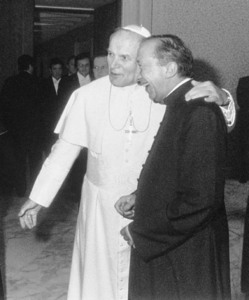
5. I know that you well understand the indispensable importance of a true and full communion between the various components of the ecclesial community. I am certain, therefore, that you will not fail to commit yourselves with renewed fervor in the search for more appropriate ways to carry out your activities in harmony and collaboration with the bishops, the pastors, and with all the other ecclesial movements.
Bring into the whole world the simple and transparent sign of the event of the Church. Authentic evangelization understands and responds to the needs of the individual man because it helps him to find Christ in the Christian community. The man of today has a particular need to have Christ in front of him, with clarity and evidence, as a profound sign of his birth, life, and death, and of his suffering and joy.
May Our Lady, Mother of God and of the Church, guide you constantly on the pathway of life. Knowing your devotion to the Holy Virgin, I hope that she will be for all of you the "Morning Star," who will enlighten and strengthen your generous commitment of Christian witness in the contemporary world.
And now I cordially give you my
Apostolic Blessing.
Pope John Paul II
